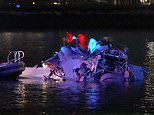Britain’s most notorious hate preacher embarked on a global bid to recruit the next generation of terrorists after being freed from jail.
Anjem Choudary faces life in prison after an unprecedented investigation uncovered he was recruiting followers in Brazil, Canada and the US.
The 57-year-old – whose lectures have spawned beheadings and bomb plots around the world – was also found to be peddling sermons to British school-children as young as 14.
Last night security experts blasted the terms of his prison release, saying Choudary was so dangerous he should never have been freed in the first place.
The cleric was jailed for five years in 2016 for inviting support for Islamic State. He was released from HMP Belmarsh halfway through his sentence in 2018 and made subject to strict licence conditions, including a ban on using the internet.
But, within three weeks of those terms lapsing in July 2021, he started pumping out press releases on social media sites such as WhatsApp and Telegram.




Over the next year Choudary gave more than 40 lectures to a spin-off of his banned Islamist group al-Muhajiroun (ALM) in New York, attracting a global audience.
Following a joint investigation by MI5, Scotland Yard, the NYPD and Canadian police, he was arrested again last July.
In the first prosecution of its kind yesterday, Choudary was convicted of directing a terrorist organisation and encouraging support for it online.
Dominic Murphy, Scotland Yard’s counter-terror boss, said: ‘ALM’s tentacles have spread across the world and have had a massive impact on public safety and security. Over 30 years, Anjem Choudary has been a pretty constant presence.’
A senior security official hailed his conviction as a very ‘significant moment’ in the fight against international terrorism.
But experts said that, given his long history of radicalising followers and encouraging terrorist acts, Choudary should never have been allowed internet access after his release.
Alan Mendoza, of the Henry Jackson Society think-tank, said: ‘He needed to have a different class of conditions and surveillance to keep him from reoffending and trying to radicalise the next generation. The reality was it was no surprise – anyone could have predicted that this is exactly what Choudary would do as soon as he had the means.’

Anthony Glees, of the Centre for Security and Intelligence Studies at the University of Buckingham, said Choudary was too dangerous to ever be released.
He added: ‘I was surprised and horrified when he was released last time round because he has never expressed any remorse for what he has done. He has never once expressed sympathy for those who have died as a result of his evil teachings.
‘He was clearly being monitored by the security services but he had a global reach and understood how to use the internet to his best advantage. But he should not have been in a position to do this in the first place.’
It can be revealed that Choudary used taxpayers’ cash to fund his defence, racking up a significant legal aid bill as he tried to justify his preaching.
Over decades, he is believed to have infected the minds of more than 100 Britons who have plotted to carry out terror attacks at home or abroad.
Khuram Butt, the leader of the London Bridge attackers who killed eight people in 2017, was said to be ‘like a lion out of a cage’ after meeting Choudary.
Usman Khan, who killed two Cambridge students at a prisoners’ conference in Fishmongers’ Hall in 2019, had Choudary’s number on his mobile phone.
And Choudary was so close to Lee Rigby’s killer Michael Adebolajo that he performed his wedding ceremony.

During his trial at London’s Woolwich Crown Court, which heard evidence from American undercover agents, Choudary insisted that ALM had disbanded in 2004. He claimed: ‘It is the Kevin Keegan effect. If you ask people about Kevin Keegan, people say he played football for Liverpool. They look at me as al-Muhajiroun.’
But New York Police Department Deputy Commissioner Rebecca Weiner labelled Choudary a ‘shamelessly prolific radicaliser’ who had a ‘transatlantic reach which was very powerful’.
In one lecture infiltrated by US undercover police, Choudary boasted he had been labelled ‘the number one radicaliser in Britain’, adding: ‘That is a badge of honour for me. It’s a medallion on my chest.’
His downfall came when an MI5 bug planted in his home in east London revealed the preacher admitting to being the leader of ALM. Police swooped weeks later as one of his followers Khaled Hussein, a petrol station attendant from Canada, flew out to meet him in July last year.
Hussein, 29, was also found guilty of being an ALM member. Both will be sentenced on July 30.












